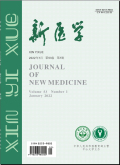新医学2024,Vol.55Issue(6):421-429,9.DOI:10.3969/j.issn.0253-9802.2024.06.004
海藻希瓦菌对小鼠结直肠腺瘤发生发展及其免疫微环境的影响
Effect of Shewanella algae on the incidence and progression of colorectal adenoma and immune microenvironment in mice
摘要
Abstract
Objective To investigate the effect of Shewanella algae(S.algae)on the occurrence and development of colorectal adenoma and its regulatory effect on the immune microenvironment in mice.Methods Twenty-four mice were divided into three groups:control group,azoxymethane(AOM)/dextran sodium sulfate(DSS)group,AOM/DSS+S.algae group.The survival status and colorectal adenoma of mice were compared among three groups.Colorectal tissues in the AOM/DSS group and AOM/DSS+S.algae group were collected for high-throughput RNA-seq.Gene set enrichment analysis(GSEA)and cell-type identification by estimating relative subsets of RNA transcripts(CIBERSORT)were used to analyze the changes of immune-related pathways,immune cells and immune factors.Results Compared with the AOM/DSS group,the body weight(P<0.05)and survival rate were decreased,the hematochezia was aggravated,the survival status was worsened,the colorectal length was shortened(all P<0.05),and the average number and size of adenomas were significantly increased(both P<0.05)in the AOM/DSS+S.algae group.Compared with the AOM/DSS group,the inflammatory responses were significantly enhanced in AOM/DSS+S.algae group(P<0.05).The production of pro-inflammatory cytokines including interleukin(IL)-2,IL-6,IL-12,IL-17,interferon(IFN),tumor necrosis factor(TNF)(all P<0.05)and IL-1β showed an upward trend in the AOM/DSS+S.algae group,while the production of anti-inflammatory cytokines including IL-4,IL-10,IL-13(all P<0.05)and transforming growth factor β showed an inhibitory trend.Both naive B cells and plasma cells(both P<0.05)were increased in AOM/DSS+S.algae group,and the nuclear factor-κB(NF-κB)signaling pathway was activated.Conclusion S.algae may form a tumor-promoting immune microenvironment by activating immune signals,such as activation of B cells and activation of the NF-κB pathway,and then promote the development of colorectal adenoma.关键词
海藻希瓦菌/结直肠腺瘤/免疫微环境/NF-κB/B细胞Key words
Shewanella algae/Colorectal adenoma/Immune microenvironment/NF-κB/B cell引用本文复制引用
徐微微,阳柳思,徐婧,周有连,王红..海藻希瓦菌对小鼠结直肠腺瘤发生发展及其免疫微环境的影响[J].新医学,2024,55(6):421-429,9.基金项目
广东省自然科学基金(2021A1515012536) (2021A1515012536)

